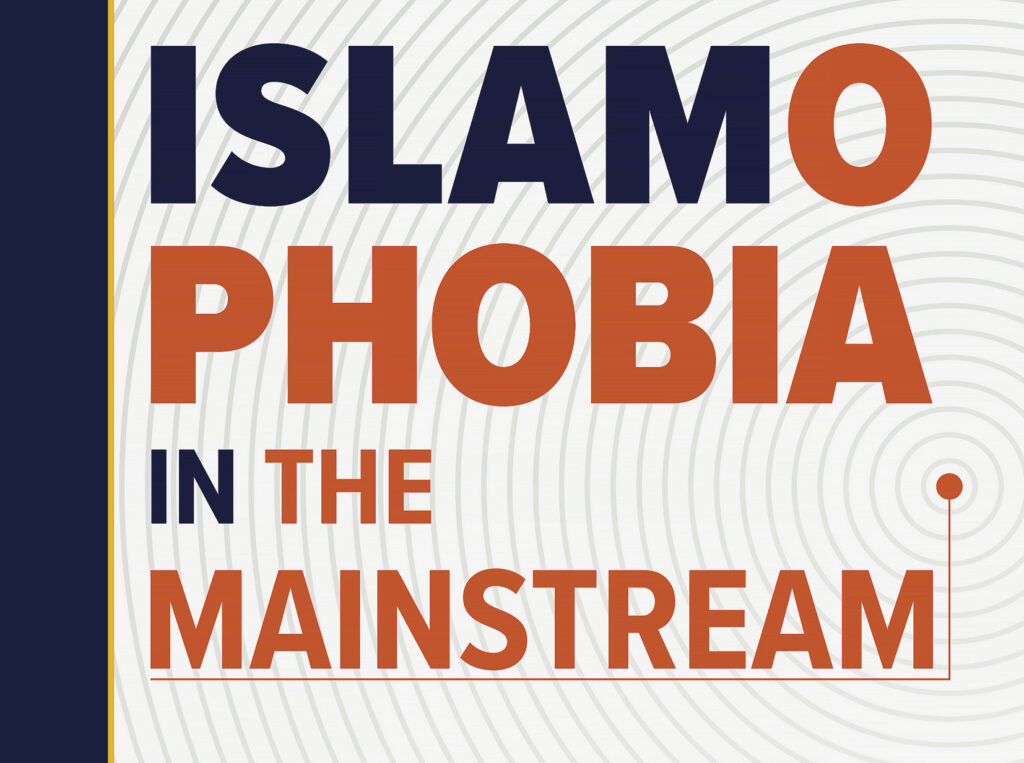Still no cure in sight for a malignant pre-pandemic virus — Islamophobia

By Ismail Allison
March/April 2022
$105,865,763. According to the findings of “Islamophobia in the Mainstream,” the recently published report by the Council on American-Islamic Relations (CAIR), this country’s largest Muslim civil rights and advocacy organization, that’s the amount of money received by 26 anti-Muslim organizations between 2017 and 2019.
These organizations are part of what CAIR identifies as the country’s Islamophobia Network, an interconnected, interdependent web of politicians, think tanks, scholars, religious groups and activists who promote anti-Muslim bigotry. Despite their extremism, CAIR’s report demonstrates that this network receives much of its funding through reputable, mainstream charities.
Among these charities are donor-advised funds like the Fidelity Charitable Gift Fund Foundation and the Schwab Charitable Gift Fund. CAIR’s report explains that donor-advised funds, or DAFs, differ from private foundations in that at their core are private contracts between donors and funds that guarantee the former with immediate tax write-offs and come with no requirement that the contribution be put to charitable uses.
Because contributors to DAFs are frequently anonymous, it’s nearly impossible to track funds to their ultimate source. CAIR’s report explains that the mainstream DAFs being used to funnel money to Islamophobia Network groups may not even be aware of who they’re funding.
So, what does the Islamophobia Network do with all that money? CAIR’s report explains that the recipients use it to spread false information about Islam and Muslims in the U.S. and around the world “through social media, the press, public hearings, and other avenues.” They also support and advocate for policies that negatively impact Muslims at home and abroad, such as former President Donald Trump’s Muslim Ban. Network groups also enable special interest lobbying by anti-Muslim bigots. Organizations belonging to the network have targeted local Muslim communities with public displays of animus and bigotry, such as the anti-sharia demonstrations organized by Brigitte Gabriel’s ACT for America.
By promoting anti-Muslim bigotry in politics and the media, the Islamophobia Network creates hostility toward Muslims in society.
Surveys of Muslim students conducted by CAIR offices in Texas, California and Massachusetts in recent years revealed that Muslim students face high levels of religiously motivated bullying. Many do not feel safe expressing their Muslim identity or contributing to classroom discussions on Islam and Muslims.
CAIR’s report documented 16 anti-mosque incidents from 2019 to 2020, including incidents of damage, destruction and vandalism, and intimidation and harassment.
The Islamophobia Network’s influence reaches higher than classrooms and houses of worship. CAIR’s report lists 40 instances in which institutional leaders, which it defines as those who hold positions of power and influence within respected institutions, such as a police chief or school board member, posted anti-Muslim content online.
Trump appointed seven individuals with histories of anti-Muslim bigotry to positions of national prominence. Among them was Kayleigh McEnany, appointed White House Press Secretary in 2020. In 2016, she wrote on Twitter that “Obama endlessly preaches tolerance of Islam but never mentions this — ‘Genocide: Christian Population in Iraq Drops 80% in a Decade.” In an op-ed she wrote for The Hill in 2017, McEnany criticized (now former) German Chancellor Angela Merkel (2005-21) and other European leaders for allowing Muslim refugees to enter their nations, which, she claimed, “resulted in a culture in crisis — a culture without democratic, freedom-loving identity and constantly under murderous attack from cancers within.”
In May 2020, the U.S. Agency for International Aid (USAID) appointed Mark Kevin Lloyd, who referred to Islam as a “barbaric cult,” as its religious freedom adviser. Trump also appointed Tony Perkins, who has a long history of anti-Muslim rhetoric, chairman of the U.S. Commission on International Religious Freedom in 2019.
In 2020, Trump appointed white supremacist sympathizer and noted anti-Muslim bigot Sebastian Gorka, who said that terrorism is rooted in Islam and the “martial parts” of the Quran, to the National Security Education Board. He also appointed Charles M. Kupperman, an individual with close ties to individuals and organizations within the Islamophobia Network, as deputy national security adviser.
With anti-Muslim bigotry being promoted by the Islamophobia Network and permeating some of our nation’s most powerful institutions, as well as having a direct negative impact on the lives of American Muslims, CAIR’s report calls on the charitable organizations used by bigots to funnel money to implement clear anti-hate policies to ensure that funds don’t go to hate groups.
CAIR’s report recommends that charities familiarize staff and stakeholders with key network players, hold educational initiatives on anti-Muslim bigotry for staff and board members, and investigate grantmaking procedures to learn if they are being used to funnel money to hate groups.
CAIR also calls on interfaith communities to implement faith-based programs aimed at marginalizing hate speech and anti-Muslim bigotry in local communities.
Speaking at a virtual press conference announcing the publication of his “Islamophobia in the Mainstream,” Huzaifa Shahbaz (research and advocacy coordinator, CAIR) said, “Until we take Islamophobia seriously, we will unfortunately continue to see anti-Muslim bigotry on the rise.”
Ismail Allison is national communications coordinator at CAIR, Washington, D.C.